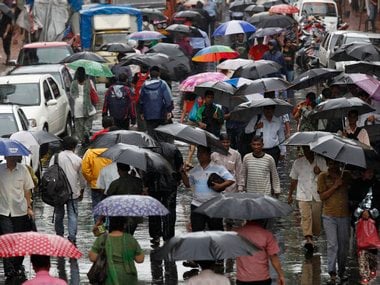Editor’s note: This article was originally published on 26 May, 2017. It is being republished in light of the heavy rains that lashed Mumbai on Wednesday, leaving many parts of the city waterlogged. In his My Son’s Father, poet and writer Dom Moraes wrote of a sight in London. “It was autumn, the gutters and parks of the city were populated with dead leaves.” In low moods soon after his arrival, he apparently was not inclined to wax like an American would about his fall season and the flash of vivid colours. In India as of now, when the monsoon is due just a few weeks away, it can always be said, albeit in a different way. Every year during the impending arrival of the monsoon, the country’s gutters and all public places are populated by plastic waste mostly with used and discarded thin bags. [caption id=“attachment_451710” align=“alignleft” width=“380”]  Representational image. Reuters[/caption] Not that they are not there at other times of the year. It is only that they are noticed and written about, photographs published in the media because the glut of stuff chokes the paths of rainwater. Consequently, the blocked water inundates roads, residential and business areas to such an extent that it disrupts normal life. With regard to Mumbai, “disruption” is an understatement. Non-removal of the toxic garbage, speedily and in time reflects poorly on the municipal administration’s efficiency. Non-removal of all of it but claims to the contrary can be seen as the contractors’ dishonesty and the civic body’s connivance. However, every year, it is like a last-minute action. It seems to be a legitimate suspicion that the general belief among municipal bodies is that a good rain would take away with it the garbage accumulated over nine months after a part of it has been removed as a pre-monsoon preparedness. That is probably the annual gamble. The slack and lag, however, are not the prerogative of Mumbai city government alone but in all towns and cities around it. It is as if they wake up to smell coffee only when the monsoon is close. Even if there have been delayed arrival of monsoons, there have hardly been any attempts to preempt the possible threats due to flooding as a result of choked drains. As per assessments available, Dombivli has so far has had only a fifth of its drains cleared of built up muck. In Thane, the second largest by population after Mumbai in the region, about a third of the work remains to be done more contractors, that is as many as 65, have been assigned the work. We have the infamy of recognising Mithi as a river only after it was realised that in that year of cloudburst last decade, the water that was sent down in torrents had no escape. Without a riverfront, the banks heavy with encroachments of all kinds, Mumbai had thought of it as a huge and unmanaged gutter. Even today, the multi-crore rupee clean-up is incomplete. Mumbai also has rivers apart from rediscovered Mithi and they are Oshiwara, Poisar, Dahisar but we see them as drains because the city never looked at them as such. Rivers, as the Thames, ought to actually have been the city’s small prides. The municipal administration in Mumbai has been hamstrung because, for the second year in a row, contractors have not bid for the work. Therefore the work happens only on minor drains at ward levels, involving NGOs. Of course, in all drains in the large metropolitan region, it’s not just removing the plastic and garbage but also desilting them. Cities are not like dams on rivers which, because of poor soil holding capacity of the catchment, bring with them the silt which builds up during the monsoon. In our towns and cities, they build up in the other two seasons before the monsoon. The only reason could be we are in dust-laden urban spaces. Mud on the road is not rare but a constant presence which flows into drains. However, it would be cruel to blame only the civic bodies. They do not throw garbage into the drains. They pick up a huge lot — in thousands of tonnes per day basis — of it and take most of it to the inadequate landfills. It is the people who are responsible for the careless discarding of garbage, plastic included. They are hardly ever blamed, but in turn, they point to here at the city government which is, by tradition and work culture, slack. Snails could often, so to say, beat them in a race. But no outreach programme can succeed before the city government ensures that garbage bins are in easy reach. Else, it would remain only at the level of perpetual shadow boxing. It is like this: you cannot ask people not to pee on the roads unless there are clean, usable, enough toilets spread across the cities. Likewise, with garbage bins. It is criminal to use and throw the banned under-eight micron plastic bags, but as mandated enforcers of that ban, civic bodies have done just nothing.
The municipal administration in Mumbai has been hamstrung because, for the second year in a row, contractors have not bid for the work.
Advertisement
End of Article
Written by Mahesh Vijapurkar
Mahesh Vijapurkar likes to take a worm’s eye-view of issues – that is, from the common man’s perspective. He was a journalist with The Indian Express and then The Hindu and now potters around with human development and urban issues. see more


)

)
)
)
)
)
)
)
)



